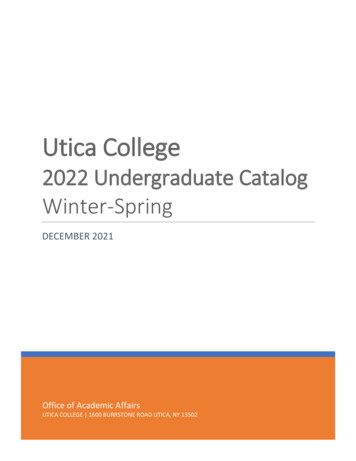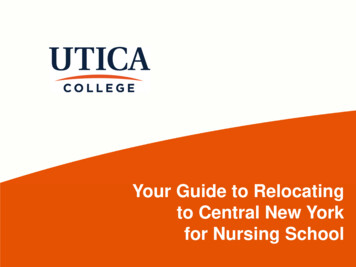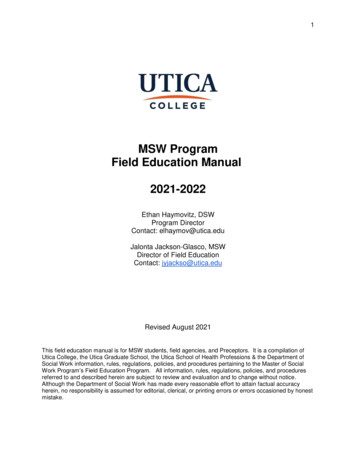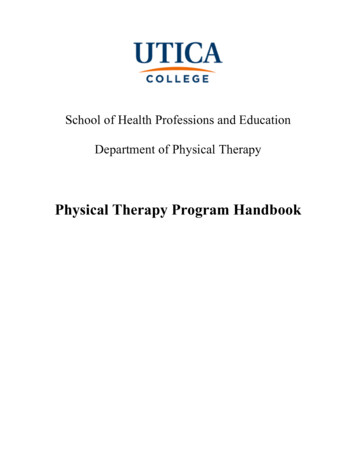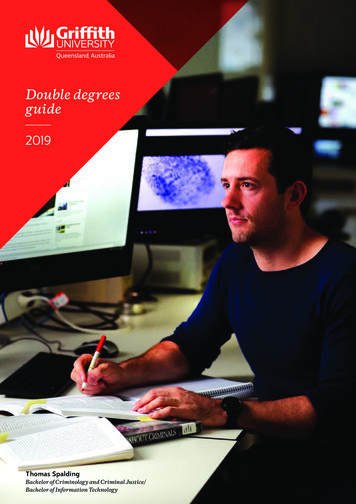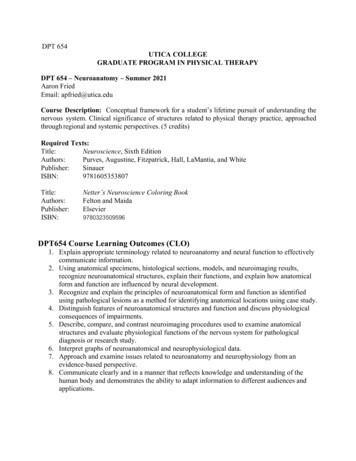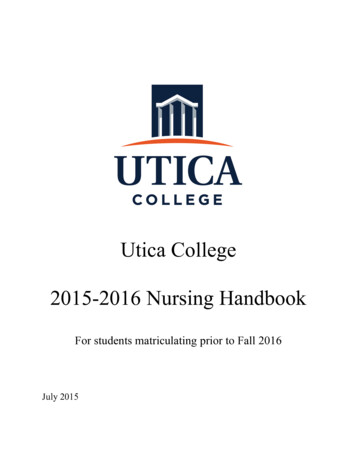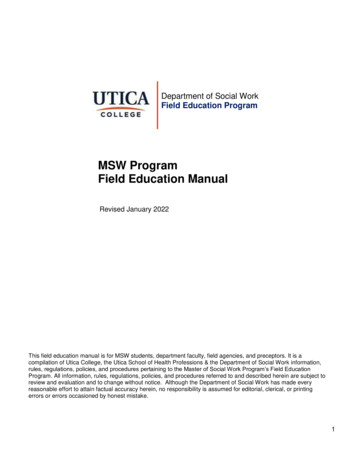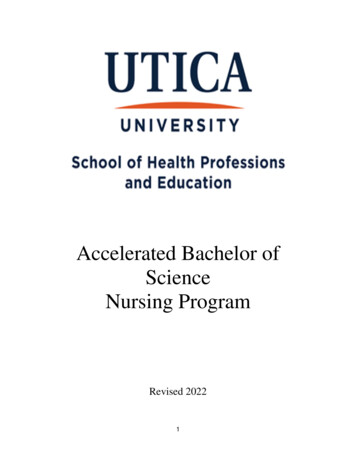
Transcription
Accelerated Bachelor ofScienceNursing ProgramRevised 20221
Table of ContentsALL PROGRAMSPAGEWelcomePurpose of HandbookNotice of ComplianceMission StatementVision StatementDepartment GoalsABSN Program OutcomesIntellectual HonestyCommunication PolicyAmerican Nurses' Association Code of Ethics for NursesConfidentiality Statement/HIPAASocial Media PolicyAlcohol and Drug Policy3344444556778Admission CriteriaSequence of CoursesCourse DescriptionsRetentionGrading PolicyTesting PolicyProcedure for Modified Progression and DismissalRules and Regulations Pertaining to the Clinical ExperiencesClinical Attendance PolicyUniform PolicyHealth Clearance RequirementsCPR/BLS CertificationPredisposing Medical ConditionsBloodborne Pathogen ExposureHealth InsuranceMalpractice InsuranceCommunicationBackground Check and Drug TestingStudent Representation on Department of Nursing CommitteesGraduation RequirementsProfessional Licensing ProcedureComprehensive Assessment and NCLEX-RN pre-testSuccess Coach Role and 4242
WELCOME FROM THE DIRECTORWelcome Future Nurses!You have made an important decision to continue your education and pursue a career in nursing.We are honored to be part of your journey. Nursing is more than a job, it is a profession. To be anurse is an honor and a privilege. Your nursing education will require passion, determination,integrity, and commitment. You will be challenged in ways you probably have not experiencedbefore in your previous academic programs. However, in 16 short months, you will be rewardedin ways you have not been before as well.The faculty and staff of the Utica College ABSN program are committed to your success! Wewill provide you with the resources you need to achieve your goals and become a nurse. We areconstantly evaluating our policies, processes, and curriculum to ensure we are delivering themost effective and evidence-based education to you. While you will not have a great deal of faceto face interaction with your course faculty, they are going to be your greatest source of support.Please do not hesitate to reach out to them with questions or concerns. We will be happy toarrange a meeting with you at any point.To complete a Bachelor’s degree in Nursing in just 16 months requires that you dedicate 50 to 80hours per week on your studies, depending on the semester. Your first challenge will be tomanage your expectations around that workload. Trust the process, trust your faculty, and trustthat you can do this! I promise you the next 16 months are going to fly by.Please do not hesitate to reach out if I can be of any assistance along the way.Wendy Moore PhD, RN-C MNN, CNEAssistant Professor of NursingABSN program Directorwlmoore@utica.edu315-223-2471PURPOSE OF THE HANDBOOKThis handbook is to be used in conjunction with the Utica College Student Handbook, andstudents are responsible for adhering to the content of both handbooks. Changes in policies andprocedures may be made annually and communicated to students via the updated handbook.The information included in this handbook has been chosen with two purposes in mind. First, aninformed student is a better student. We want students to understand the educational goals andmission of the entire program in order to facilitate integration of individual course content intoyour overall view of the nursing profession.Second, the faculty and staff take seriously the responsibility of providing students with a qualityeducation that will prepare them to fulfill their responsibilities as a professional nurse. However,the student is the one ultimately responsible for taking full advantage of the program. Thishandbook provides students with the information necessary for them to take on thatresponsibility.3
NOTICE OF COMPLIANCEThe Department of Nursing adheres to the statement of equal opportunity in every aspect ofstudent recruitment, admission, and retention. It is the policy of Utica College to admit studentswho can benefit from the educational opportunities it offers and whom the College has thecapability to serve. Students are admitted on the basis of their potential for intellectual, social,personal, and professional growth. Please review the Utica College non-discrimination policy formore information.DEPARTMENT OF NURSING MISSION STATEMENTOur mission is to provide high quality, innovative, and transformational education to diverselearners and professionals. We prepare nurses to excel in critical reflection, clinical competency,collaboration, caring, and leadership through evidenced based nursing science. Nurses preparedat Utica College are a vital component of the interprofessional healthcare team, responding tohealth needs across the lifespan locally and globally.DEPARTMENT OF NURSING VISION STATEMENTThe Utica College Department of Nursing will be recognized as an innovative center of nursingexcellence for learners and professionals regionally, nationally, and internationally. The schoolseducators, clinicians and researchers will inspire the next generation of nurse leaders to respondto the challenges of the dynamic and diverse healthcare environment.DEPARTMENT OF NURSING GOALS1. Liberal Education Foundation: Assimilate theories and concepts from liberal educationinto generalist foundation practice.2. Leadership: Practice leadership concepts to deliver high quality health care.3. Professional Behavior: Incorporate professional standards of moral, ethical, and legalconduct into practice.4. Clinical Competence: Provide safe, competent care across the life-span.1.2.3.4.ABSN PROGRAM OUTCOMESIntegrate the arts and sciences with nursing science as a foundation for generalist nursingpractice, utilizing technological, verbal, and written methods of communication.Apply inter-professional, management, and leadership principles based on currentevidence that supports quality outcomes in generalist nursing practice.Demonstrate ethical, moral, and legal standards of professional behavior with individuals,families, and groups across diverse health care settings.Use critical reflection, current evidence, diagnostic reasoning in the promotion of health,reduction of risk, and management of illness with diverse populations across the lifespan.4
ACADEMIC HONESTY POLICYIn addition to the Utica College regulations regarding academic honesty (Utica College CollegeCatalog), and the Code of Student Conduct, the Department of Nursing faculty has developedthe following policy statement:The faculty and students of the Department of Nursing believe that ethical behavior in theAmerican Nurses' Association Code for Nurses implies the highest standards of honesty andintegrity, and applies equally to nursing students and practicing nurses. All aspects of theDepartment of Nursing life and culture are designed to further the achievement of thesestandards.Students should maintain academic honesty at all times. Students must do their own work on alltests and assignments. Any quoted or paraphrased phrases or sentences from published material,Internet sources, or other individuals’ work must be correctly referenced. Students may notresubmit their own previously graded work when retaking a course or for a grade in a differentcourse without faculty approval. Resubmitting earlier work will be considered self-plagiarismand treated as any other form of academic dishonesty. Refer to the Utica College AcademicHonesty site.COMMUNICATION POLICYStudent Communication Policy- Academic ConcernsWhen students have a concern about their learning experience, the following is the bestpath to a *resolution.1. The student(s) shares the concern with the faculty member directly involved withthe current course, clinical and/or lab.2. If unresolved, the student(s) may request an appointment to discuss, or send awritten description of their concern to the Academic Site Director.3. If unresolved, the student(s) may request an appointment and send a writtendescription of their concern to the Director of the Nursing Program*Seeking a resolution without going directly to the faculty member, will risk a longer andmore complicated response. However, the student may wish to discuss the concern withtheir success coach and/or advisor to seek support and direction regarding the best wayto articulate the concern, identify their need and identify suggestions for collaborativeproblem solving.PROFESSIONAL NURSING CODE OF CONDUCTSince students are preparing for a professional role, professional conduct is expected in allaspects of the course. The Utica College DON will additionally uphold the American NursesAssociation (ANA) Code of Ethics as the standard for professional conduct of nurses. Nursingstudents are referred to http://nursingworld.org/codeofethics .The Utica College DON iscommitted to the development of a professional nurse who will practice within the ANA NursingCode of Ethics and whose practice is guided by the values of altruism, autonomy, human dignity,integrity and social justice. Our goal is to graduate students will practice with these inherentvalues and to ensure the profession continues to be accountable to and trusted by the5
communities we serve. Behavior that deviates from the ANA Nursing Code of Ethics will not betolerated within the nursing program and can result in course failure and or dismissal from theUtica College DON Nursing Program.AMERICAN NURSES’ ASSOCIATION CODE OF ETHICS FOR NURSES (2015)1.The nurse, practices with compassion and respect for the inherent dignity, worth, andunique attributes of every person.The nurse’s primary commitment is to the patient, whether an individual, family, group, orcommunity or population.The nurse promotes, advocates for, and protects the rights, health and safety of the patient.The nurse has authority accountability and responsibility for nursing practice; makesdecisions: and takes action consistent with the obligation to promote health and to provideoptimal care.The nurse owes the same duties to self as to others, including the responsibility to promotehealth and safety, preserve wholeness of character and integrity, maintain competence andto continue personal and professional growth.The nurse, through individual and collective effort, establishes, maintains, and improvesthe ethical environment of the work setting and conditions of employment that areconducive to safe quality health care.The nurse in all roles and settings advances the profession through research and scholarlyinquiry, professional standards development and the generation of both nursing and healthpolicy.The nurse collaborates with other health professionals and the public to protect humanrights, promote health diplomacy and reduce health disparities.The profession of nursing, collectively through its professional organizations mustarticulate nursing values maintain the integrity of the profession and integrate principles ofsocial justice into nursing and health policy.2.3.4.5.6.7.8.9.CONFIDENTIALITY STATEMENTAll students are required to be familiar with and comply with the Standards of ProfessionalBehavior while enrolled in the Utica College nursing program. Confidentiality is a criticalelement to a professional health care provider and compliance is required by law in order toprotect the privacy rights of patients. The Health Insurance Portability and Accountability Act of1996 (HIPAA) mandates standards that ensure privacy and security of patients’ healthinformation, as well as electronic medical records. Students are required to know these privacyrules and will comply at all times. Students in clinical have access to protected health information (PHI) of patients on a“need to know” basis and it is solely for use within the scope of duties relating to patienttreatment. Students may only access the PHI of patients if they are directly participating in theirtreatment.6
Students may not record PHI of patients (such as name, social security number, date ofbirth, etc.) on forms which are turned in for clinical or class assignments. PHI will notbe removed from the health care facility. This includes oral, written, and electronicdisclosures. Students may never discuss PHI in public or inappropriate areas to include but not limitedto hallways, elevators, restrooms, cafeterias, etc., or with friends/family at any time. Failure to protect PHI may be considered a violation of a patient’s right toprivacy. Properly dispose of documents containing PHI by discarding them in assignedcontainers marked for proper disposal; do not throw these documents in the trash. If a student is unsure whether his or her actions will be in violation of these policies, heor she must consult the instructor prior to taking action with the PHI. Any student in violation of these policies may be terminated from a clinical position, failthe class, and/or be removed from the nursing program, depending on the circumstancesof the violation.SOCIAL MEDIA POLICYNursing students may not video or audio record at any time in a clinical setting. They may notpost any material that could potentially violate patient confidentiality on social media sites.Students may be subject to disciplinary action by the school and the clinical agency forcomments that are either unprofessional or violate patient privacy. HIPAA regulations apply tocomments made on social networking sites, and violators are subject to the same prosecution aswith other HIPAA violations.There has been an increase in the use of electronic communication and social media methodswithin businesses, healthcare environments and academic learning institutions. It is importantwhen using these types of communication methods to be mindful of consequences of theiruse. See below for a list of guidelines. Recognize obligation to maintain privacy and confidentialityDo not disseminate information that will degrade or embarrass the patientDo not transmit patient related informationDo not post information that could reasonably identify the patientDo not refer to patients in a disparaging mannerDo not take photos or videos of patient, unless authorizedMaintain professional boundariesConsult employer policiesReport breaches of confidentiality of privacyBe aware of employer and hospital policies on the use of computers, cameras, andother electronic devices, etc.Do not post disparaging remarks about students, faculty or staff member7
ALCOHOL, DRUG AND SUBSTANCE POLICYIt is expected that all students adhere to the Utica College alcohol and other drug policies. Referto Utica College’s Annual Notice Regarding Drug and Alcohol Abuse Prevention Policies.It is the policy of the Department of Nursing that students be free of chemical impairment duringparticipation in any part of their program including classroom, laboratory, and clinicalactivities. A chemically impaired student is defined as a person who, while in the classroom,laboratory, or clinical setting, is under the influence of, or has abused, either separately or incombination: alcohol, over-the-counter medication, illegal drugs, prescribed medications,inhalants, or synthetic designer drugs. Students who are chemically impaired in the clinicalsetting may jeopardize the lives of their clients.ABSN ADMISSION CRITERIAPrior to entering the program, students must complete 60 credits in liberal arts courses, includingadmission courses. They must have a minimum of 65 credits for transfer. Students must have acumulative GPA of 2.8 or higher and a Science GPA of 3.0 or higher. A grade of C or higher isrequired in all prerequisite courses. Students must maintain a minimum GPA of 2.8 throughoutthe program and earn a grade of C or higher in all nursing courses.Applicants who have previously been enrolled in another nursing program must submit two (2)letters of recommendation from faculty in the program with their application.Required Science Admission Courses must be completed within the past 10 years and have acombined GPA of 3.0:Admissions Science CoursesCreditsHuman Anatomy & Physiology I with Lab4Human Anatomy & Physiology II with Lab4Chemistry with Lab4Microbiology with Lab4There are no statutes of limitations with the following courses:Other Admissions CoursesCreditsStatistics38
Developmental Psychology (Lifespan)3SEQUENCE OF COURSESAt Utica College, the ABSN program is designed to provide students with a professionalfoundation that integrates nursing theory with skills required for nursing practice. The programleads to a bachelor’s of science (BS) in nursing. Students must successfully complete all of thenursing courses in each semester before they can take courses in the next semester- theymust follow the program sequence.Professional nurses are liberally educated practitioners who function as primary providers ofhealth care services to individuals, families, groups, and communities. Nurses workcollaboratively with physicians, social workers, therapists, and other health professionals.Graduates of the program have opportunities in a variety of settings including acute care,community agencies, home care, and schools. All students enrolled in clinical courses must holdcurrent certification in CPR, Basic Life Support, have health and liability insurance, and meet thehealth requirements of the respective agencies. Transportation is the responsibility of the student.Details about these requirements are available from the program office.The ABSN program is fully accredited by the Commission on Collegiate Nursing Education(CCNE), and is approved by the New York State Education Department. Graduates are eligibleto take the National Council Licensure Examination for Registered Nursing (NCLEX-RN).This is a full-time program. There is no option for part-time program completion.Credit HoursCredit HoursSemester 1NUR 311NUR 321NUR 326NUR 332Semester 3NUR 411NUR 421NUR 423NUR 365NUR 446NUR 445Semester 23433--13NUR 312NUR 371NUR 444NUR 366NUR 333Semester 4NUR 412NUR 465NUR 471NUR 473NUR 346241333--16935333--1752513--16Total 62 credits
COURSE DESCRIPTIONSFollowing is a description of the major and major-related course offerings required in the nursingprogram. Courses are listed with the relevant credit hour distribution—lecture, lab and clinical.First Semester 13 creditsNUR 311 Socialization to Professional Nursing (3) (Lecture)Sets the foundation for professional practice that is built upon throughout the curriculum.Students are introduced to all aspects of the nursing profession, including an overview of nursingroles, theory, and professional practice.NUR 321 Foundations for Nursing Care (4) (2 Lecture, 1 Lab, 1 Clinical)Foundations of nursing practice and the nurse-patient relationship. The essential elements ofcaring, critical thinking, teaching, assessment, communication, and professionalism areaddressed. Includes lab and clinical.NUR 326 Health Assessment (3) (2 Lecture, 1 Lab)Provides opportunity through classroom and laboratory sessions for students to learn the theoriesand skills involved with assessment of physical, psychological, social, cultural, andenvironmental aspects of clients across the life span.NUR 332 Pathophysiology (3) (Lecture)Basic principles and processes of pathophysiology including cellular communication, genetics,forms of cellular injury, fluid and electrolytes, acid-base balance, immunity, stress, coping,illness, and tumor biology.Second Semester 17 creditsNUR 312 Leadership and Informatics in Professional Nursing (3) (Lecture)Differentiates nursing leadership from nursing management and describes how nurses leadprofessionally. Additionally, this course will explore the impact of informatics and technologyon nursing, patient care, and health care delivery.NUR 366 Care of the Aging Population (8 weeks, 3 credits) (2 Lecture, 1 Clinical)In-depth look at older adults who constitute a majority and growing proportion of people whoreceive nursing care. Includes learning strategies to assist the aging population to maintainoptimal health with chronic illness.NUR 371 Medical/Surgical Nursing Care I (5) (2 Lecture, 1 Lab, 2 Clinical)Builds upon theoretical concepts, integrating the nursing process to facilitate individual andfamily adaptation to acute stressors within medical-surgical nursing. Common physiological andpsychosocial stressors and related principles of care management are explored.10
NUR 333 Pharmacology (3) (Lecture)Information for safe, effective nursing care related to pharmacology. Covers actions, uses,administration alerts, pharmacokinetics, pharmacodynamics, adverse effects, contraindications,interactions with other drugs, herbs and food, and treatment of overdose and antidotes.NUR 444 Care of Populations With Psychiatric Concerns (8 weeks, 3 credits) (2 Lecture, 1Clinical)The nurse-client relationship and therapeutic communication techniques as they relate to thosewith mental health considerations. Includes neurobiological processes and therapeutictechniques.Third Semester 16 creditsNUR 411 Management in Professional Nursing (Health Policy) (2) (Lecture)Expands the knowledge of nursing management in practice, education, political, and communitysettings. It emphasizes the essential elements of management, including different managementtechniques and routine tasks such as budgeting, planning, supervision, and delegation.NUR 421 Medical/Surgical Nursing Care II (4) (2 Lecture, 2 Clinical)Focuses on increasing complexity of illness, nursing process in the adult population, complexphysiological and psychosocial stressors, and related principles of patient care management.NUR 423 Senior Nursing Care Seminar Lab I (1) (Lab)Seminar based course which explores patient scenarios through case studies, laboratoryexperiences, and simulation. Students work in teams to analyze patient situations and developcritical thinking skills in the effective delivery of holistic patient care.NUR 365 Care of the Obstetric Population (8 weeks, 3 credits) (2 Lecture, 1 Clinical)Focuses on maternal, paternal, fetal/neonatal, physiologic, and psychosocial responses tochildbearing. Family theory provides framework for interpreting and understanding the way thefamily adjusts to pregnancy, birth, and the addition of the newborn.NUR 446 Care of the Pediatric Population (8 weeks, 3 credits) (2 Lecture, 1 Clinical)The nurse’s role in promoting adaptation in the childbearing family. Particular stressors includeperinatal complications, well-child health promotion, and childhood illness.HLS 445 Clinical Research (3) (Lecture)Research methods employed in clinical settings. Quantitative and qualitative methods; researchdesigns related to clinical situations.Fourth Semester 16 creditsNUR 412 Trends in Professional Nursing (5) (3 Lecture, 2 Clinical)Focuses on preparation for the transition from student to professional baccalaureate generalistnurse. Trends and issues regarding nursing education, research, and practice are analyzed withina historical, social, and multicultural systems framework. *Students must successfully completeall previous courses, including NUR 471 and NUR 473 before beginning the clinical portion ofthis course.11
NUR 465 End-of-Life and Palliative Care Practice (2) (Lecture)Physical, psychological, social, and spiritual concerns of patients and families as they relate topain and comfort care, and end-of-life decisions.NUR 471 Advanced Medical/Surgical Nursing (5) (3 Lecture, 2 Clinical)Integration of theoretical, clinical, and professional concepts to provide care for patients withcomplex health issues. Emphasis on assessment, differential diagnosis, pathophysiology,pharmacology, critical thinking skills, and clinical judgment.NUR 473 Senior Nursing Care Seminar Lab II (1) (Lab)Nursing care, communication within healthcare teams, delegation of care, and cultural, legal, andethical implications. The role of the registered professional nurse as leader in the management ofpatient care.NUR 346 Care of Populations and Communities (3) (2 Lecture, 1 Clinical)Health of populations and communities through study of epidemiology, health promotion, anddisease prevention across the life span. The influences of environment, genetics, culture,economics, and access to care are analyzed.Total required nursing credits 62Clinical hours 588Lab hours 225Sequence of Courses**Please note the College requirements for writing competency as outlined in the CollegeCatalog.***127 credits are required for graduation, 60 of these credits must be in the liberal arts andsciences.RETENTIONSuccess in the nursing curriculum requires that students demonstrate the knowledge, skills, andprofessional behaviors expected of an entry-level registered nurse. Knowledge and skills areexamined in a variety of formats including written assignments, testing, and clinical observation.The faculty at Utica College strive to provide a successful educational experience for everystudent. Each student is required to meet the following criteria in order to remain in the nursingprogram:The student must:1. Achieve and maintain a minimum 2.8 cumulative G.P.A. throughout the entire nursingprogram.2. Demonstrate the professional and ethical behaviors required for successful performanceof professional nursing practice as noted by faculty and clinical instructors.3. Adhere to established course sequence in nursing major.12
4. Adhere to Utica College academic rules and regulations. (See Undergraduate Catalogwith the exception of GPA requirement that is specific to the nursing programs).Retention Criteria1. Students are expected to be aware of prerequisite course requirements. Prerequisites willnot be waived. Program courses are listed and scheduled in semester sequence, thusmaking them prerequisites for successive semesters.2. A minimum grade of C (77%) will be required for all nursing courses. A student whoachieves a grade of less than a C in a nursing course has one opportunity to repeat thecourse. A maximum of one nursing course may be repeated. Progression in thenursing program is based on seat availability in the course. Failure to achieve theminimum grade of C in the repeated course will result in academic dismissal from thenursing program.3. To achieve a passing grade, the student must meet the following criteria:a. Exam grade of 77% or higher based on weighted average of unit exams and finalexam (321, 371, 421, 471).b. Course grade of 77% or higher when all theory components are added to the examgrade.c. Successfully pass clinical (when applicable) as outlined in the clinical evaluationmeasurement tool.d. Successfully pass lab (when applicable) as outlined in the lab (comp) packet.e. Students who do not meet all of the above course requirements will receive a finalcourse grade of C, unless the overall course grade is less than a C, in which casethe final course grade will reflect the grade the student has earned.4. Students must successfully complete all of the nursing courses in a semester beforemoving on the next semester of courses.5. Students must adhere to established course sequence in nursing major6. A student who withdraws from any nursing course jeopardizes his or her progression inthe program.7. Students who are placed on academic probation by the College will be suspended orrequested to withdraw from the nursing major.8. Students are expected to maintain standards of professional behavior withinacademic and clinical settings. The student who fails to meet these standards maybe subject to dismissal from the ABSN program and the College. Expectedbehaviors include but are not limited to:a. Attend all labs, exams, and clinical experiences, and arrive on time. In the caseof illness or an emergency, the appropriate faculty member must be telephonedprior to lab/exam/clinical.b. Prepare for class/lab/clinical according to course requirements identified in eachcourse syllabus.c. Complete all assignments according to the time frame posted in the syllabus.d. Demonstrate respect and courtesy toward faculty, staff, and fellow students.e. Demonstrate honesty and integrity in all academic and clinical settings.f. Contribute to the educational growth of self and fellow students.g. Wear appropriate attire for course as identified by syllabus, faculty ororganizational partners.13
9. It is the responsibility of the student to check Banner and make sure all requirements aremet and posted.10. For graduation requirements, students are encouraged to review the College Catalog andtheir individual degree evaluations.GRADING POLICYThe Department of Nursing grading policy is defined by a numerical rating system as follows:Acceptable Grades – PassA 94 –100%A 90 – 93%B 87 – 89%B 83 – 86%B 80 – 82%C 77 – 79%Unacceptable GradesC 73-76%C 70-62%D 67-69%D 63-66%F 62% and below* Incomplete (I) grades may be granted according to the College policy (see College Catalog).A minimum of C (77%) must be achieved to successfully pass a nursing course.Grading Policy for Med-surg courses (321, 371, 421, 471)To achieve a passing grade, the student must meet the following criteria:1. Exam grade of 77% or higher based on weighted average of unit exams and final exam.2. Course grade of 77% or higher when all theory components are added to the exam grade.3. Successfully pass clinical as outlined in the clinical evaluation measurement tool (whenapplicable).4. Successfully pass lab (when applicable) as outlined in the lab (comp) packet.5. Students who do not meet all of the above course requirements will receive a final coursegrade of C, unless the overall course grade is less than a C, in which case the final coursegrade will reflect the grade the student has earned.Grading of Clinical ExperiencesAll clinical experiences are graded on a Pass/Fail basis. A grade of Pass is achieved when thestudent consistently meets or exceeds clinical expectations and has met clinical course objectivessatisfactorily. The student must pass the theory, lab, and clinical components to pass the course.Financial Academic StandardA
ALL PROGRAMS PAGE Welcome 3 . Assistant Professor of Nursing ABSN program Director wlmoore@utica.edu 315-223-2471 . Please review the Utica College non-discrimination policy for more information. DEPARTMENT OF NURSING MISSION STATEMENT Our mission is to provide high quality, innovative, and transformational education to diverse .

